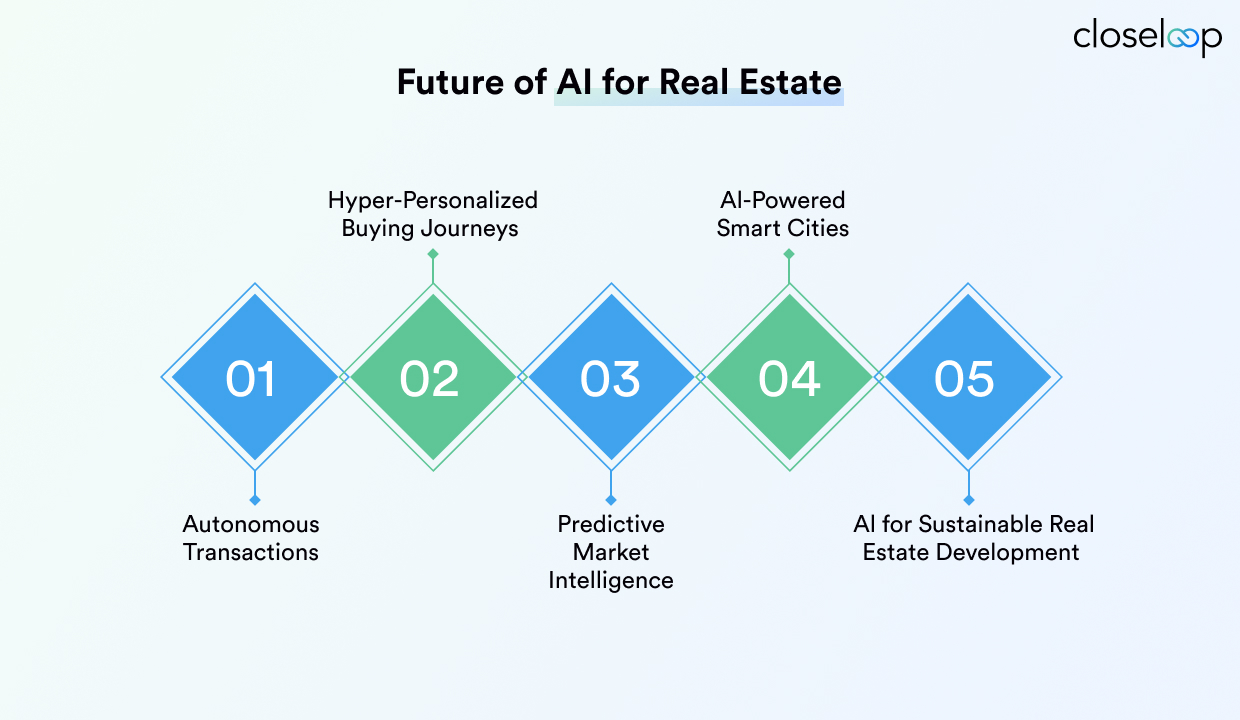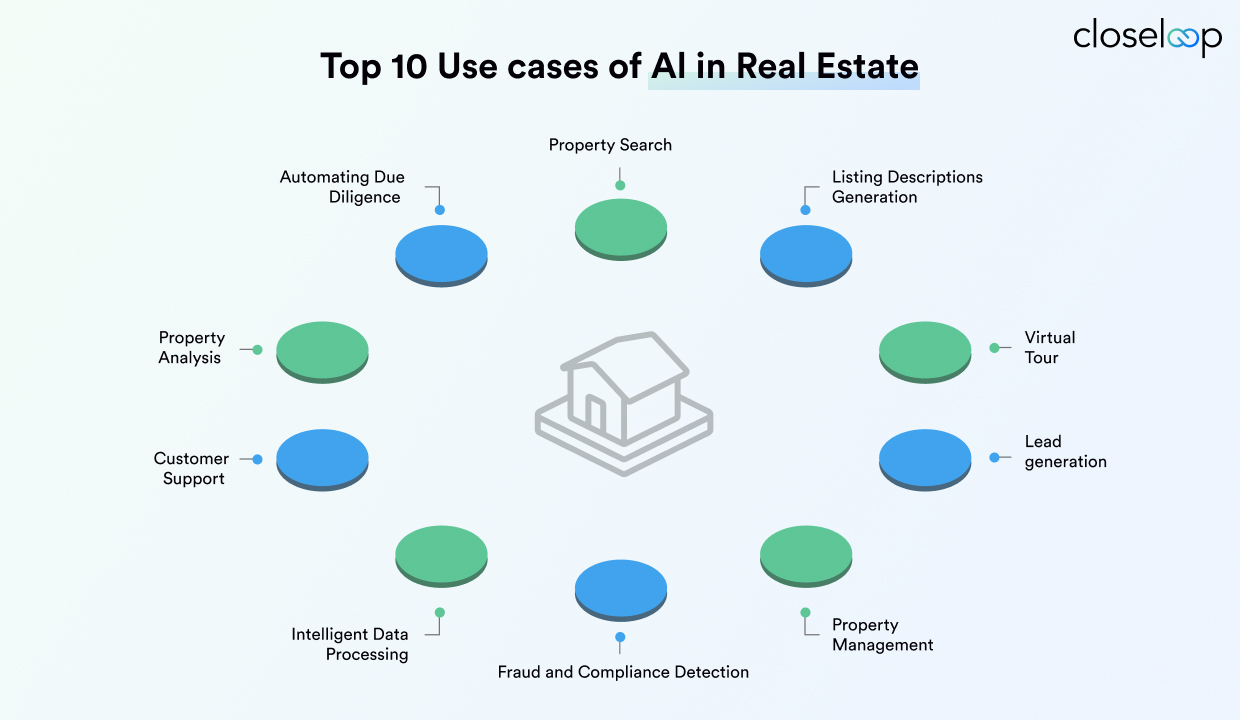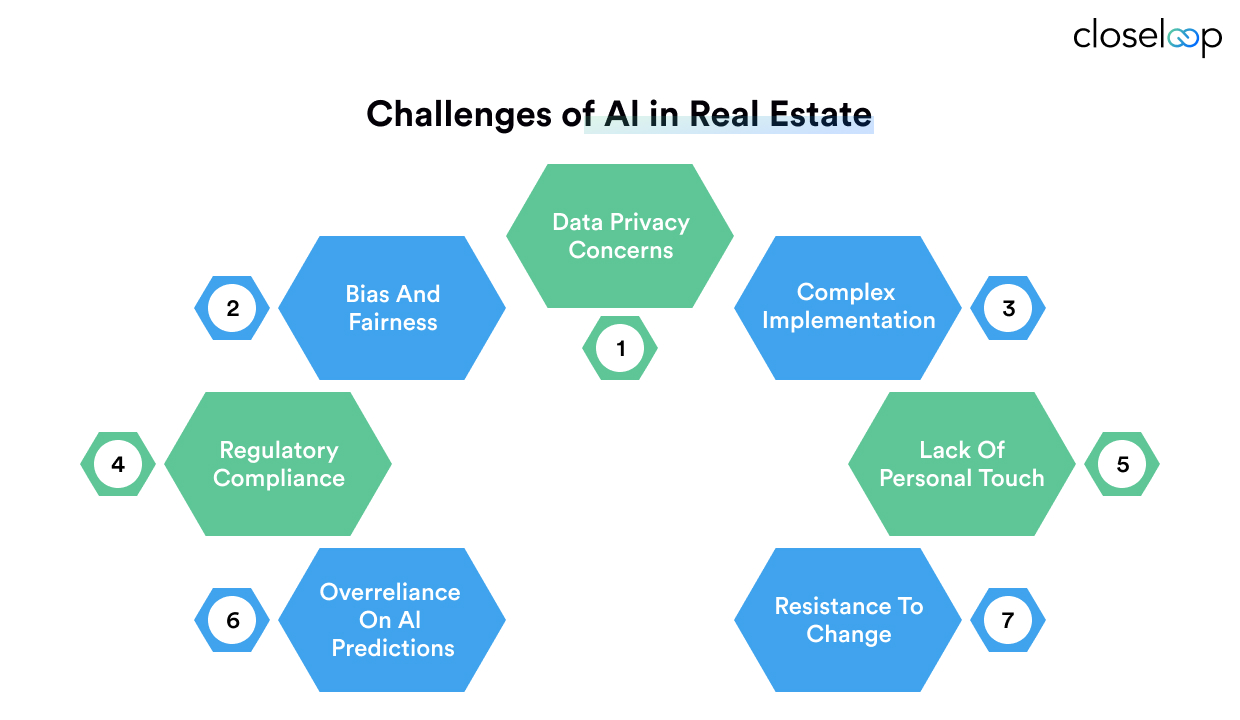Artificial Intelligence has shifted from an experimental concept to a core driver of change across industries, reshaping how businesses operate, make decisions, and interact with customers. Real estate, traditionally a labor-intensive, highly fragmented, and data-heavy sector, is now standing at a pivotal moment in its evolution. For decades, property transactions, valuations, and management processes relied on manual expertise, scattered records, and time-consuming workflows. While these methods have served the industry well, they have also limited speed, scalability, and transparency.
The last few years have seen real estate AI applications move from theory to tangible impact. Advanced machine learning models, computer vision systems, and natural language processing tools are not only automating repetitive tasks but also enabling capabilities that were previously out of reach, such as real-time market forecasting, AI-powered property valuation, and hyper-personalized client recommendations.
The market numbers underscore this shift. The AI adoption in real estate industry is on a steep growth curve, expanding from $222.65 billion in 2024 to $303.06 billion in 2025, reflecting a 36.1% compound annual growth rate. This rapid acceleration signals a fundamental restructuring of how the industry will operate in the years ahead and highlights emerging AI trends in real estate.
This blog explores AI’s growing footprint in real estate, from its role in enhancing decision-making and operational efficiency to its transformative applications in AI in property management, investment strategies, and customer engagement. It also examines the risks, challenges, and ethical considerations that come with strategic use of AI in real estate, ensuring that decision-makers have a clear view of both the opportunities and the roadblocks.
By the end, you’ll have a comprehensive view of the benefits of AI in real estate and where forward-thinking organizations can position themselves to gain lasting competitive advantage.
The Shift in Real Estate: From Manual Processes to AI-Driven Operations
For much of its history, real estate has been shaped by processes that demand significant human involvement. Property valuations required on-site visits and manual comparisons. Agents and managers spent hours entering data into disparate systems. Response times to client inquiries could stretch from hours to days, often costing opportunities. Decision-making was heavily dependent on individual expertise, which, while valuable, was limited by personal bias and access to information.
Early AI in real estate largely focused on automating repetitive, low-value tasks. These included basic document processing, simple scheduling, and limited data extraction. While these functions improved efficiency, they left the industry’s more complex challenges, like accurate forecasting, market visibility, and client personalization, largely untouched.
Generative AI has introduced a new phase of transformation. Instead of merely reducing manual work, AI systems are now augmenting human expertise with advanced analytics, predictive analytics in real estate, and intelligent recommendations. The results are visible across several critical functions:
-
Automated Valuation Models (AVMs): AI-driven AVMs now analyze vast datasets, including historical pricing, property characteristics, and market trends, to produce valuations that are faster, more accurate, and less prone to bias than traditional appraisals, modern AI technology in real estate at work.
-
Risk Calculations for Mortgage Lenders: Mortgage providers are leveraging AI to evaluate borrower risk with far greater precision, factoring in a wider range of economic indicators and behavioral data that inform AI for real estate investment decisions.
-
Local Zoning Analysis for Developers: AI platforms process zoning ordinances and environmental regulations, helping developers identify viable project locations without weeks of manual research.
The customer experience has also undergone a marked improvement. Buyers can now receive curated property recommendations based on their preferences, browse AI-enhanced virtual tours, and receive instant answers to inquiries through conversational interfaces, tangible AI for real estate customer experience upgrades. On the investment side, stakeholders can make faster, data-backed decisions on when to buy, sell, or hold properties, reducing uncertainty and maximizing returns.
AI provides the scale, speed, and analytical depth that traditional methods cannot match, while real estate professionals bring the market knowledge, negotiation skills, and human connection that AI alone cannot replicate. This human-AI partnership is rapidly becoming the new operational standard for a more agile, client-focused real estate industry.
The Status Quo and Industry Readiness
AI is no longer viewed in real estate as a distant, experimental technology. It is now increasingly seen as a practical tool for solving core industry challenges. Recent industry research reinforces this shift in perception. A 2025 Deloitte survey found that over 72% of corporate real estate developers are planning to deploy AI-enabled solutions. This acknowledgment signals a growing confidence in real estate AI applications to handle high-impact, high-stakes tasks traditionally entrusted to experienced appraisers.
Similarly, a Buildium survey revealed that 48% of property managers intend to leverage technology-driven productivity gains to boost revenue. For an industry where operational efficiency directly affects profitability, this willingness to integrate AI in property management reflects an appetite for measurable ROI.
Several factors make the sector ripe for full-scale AI adoption, including the abundance of property and market data, the push for faster deal cycles, and increasing client expectations for personalization and transparency. With modern AI technology in real estate capable of unifying fragmented datasets, predicting market trends, and automating time-intensive workflows, real estate companies have a clear pathway to efficiency and growth, along with a clearer view of the future of AI in real estate.
Breaking Down the Impact and the Changes
Artificial Intelligence has quickly become the epicenter of the prop-tech market, introducing capabilities that touch nearly every part of the real estate value chain. Below are the core areas where AI is driving significant transformation.

Manual Process Optimization
Traditionally, producing property listings and marketing materials involved multiple specialists, like photographers, copywriters, graphic designers, and a considerable investment of time. Generative AI is changing this workflow. Today, high-quality listing descriptions can be generated in minutes, images can be automatically enhanced, and properties can be virtually staged, streamlining AI in real estate marketing.
Computer vision technology further expands these capabilities by converting photos or floor plans into 3D renderings and interactive virtual tours. This allows prospective buyers or tenants to explore properties from anywhere, creating realistic visualizations that rival in-person visits.
Data-Powered Market Analysis
The real estate industry produces vast amounts of structured and unstructured data, from transaction histories and pricing trends to demographic and behavioral insights. Extracting meaningful patterns from such datasets manually has been costly and time-consuming.
AI algorithms streamline this process by rapidly analyzing large volumes of information, identifying pricing fluctuations, seasonal demand trends, and regional growth patterns. These tools help distinguish between mature markets and those poised for growth, enabling more AI for real estate investment decisions.
By turning raw data into actionable intelligence, AI gives real estate professionals a forward-looking view of market conditions, supporting better timing for property acquisitions, sales, or development projects. This is strong evidence of the strategic use of AI in real estate.
Accurate Valuations with AVMs
Property valuation is one of the most critical and historically subjective processes in real estate. Human appraisers often rely on experience, comparable sales, and judgment, which can introduce bias or inconsistency. AI-powered property valuation removes much of this subjectivity.
These models use machine learning to evaluate extensive datasets, including historical sales records, property features, neighborhood statistics, and current market dynamics. The outcome is a valuation that is both data-rich and more consistent across cases. The process is faster, enabling same-day valuations, and offers clear traceability into the factors influencing the result.
For mortgage lenders, this speed and accuracy mean faster loan processing and better risk assessment. For investors and sellers, it provides confidence in pricing strategies and negotiation positions.
Personalized Recommendations
In a market where customer expectations are shaped by personalized digital experiences, AI’s role in property recommendations has become essential. By analyzing buyer or renter preferences such as location, property type, budget, and lifestyle needs, AI systems can match clients with properties that closely align with their criteria, elevating AI for real estate customer experience.
These platforms also monitor browsing behavior, past inquiries, and engagement levels to refine recommendations in real time. Beyond property matches, AI helps segment audiences for targeted campaigns, ensuring AI in real estate marketing reaches the most likely buyers.
This not only improves the customer experience but also increases conversion rates, as clients are presented with relevant, high-value options rather than generic listings.
Legal and Compliance Assistance
Compliance in real estate involves navigating a complex web of laws and regulations, from fair housing statutes to zoning ordinances and environmental rules. Manual review of contracts, permits, and other documents is not only time-intensive but also prone to oversight.
AI systems, particularly those using natural language processing (NLP), can scan large volumes of legal text to identify potential risks, violations, or non-compliance issues. They can highlight specific clauses for review, suggest corrective actions, and maintain detailed audit trails—practical, low-risk AI technology in real estate use.
In the context of mergers, acquisitions, or large-scale property transactions, AI accelerates due diligence by analyzing property titles, environmental reports, and legal correspondence, reducing both the time and the cost associated with legal review.
Automated Client Communication and Service
In real estate, timely communication is key to building trust and moving deals forward. Yet, managing inquiries, scheduling viewings, and following up with leads can consume significant agent time. AI-powered chatbots and virtual assistants are addressing this challenge, serving AI for real estate agents as a force multiplier while improving responsiveness for clients.
These tools handle common customer queries, confirm appointments, and provide property details around the clock. Using NLP, they can maintain natural, conversational interactions that feel personalized to the client. Over time, these systems learn from interactions to improve the relevance and accuracy of their responses.
For agencies, this means better lead management and reduced response times. For clients, it offers immediate access to information and services, improving satisfaction and increasing the likelihood of successful transactions.
ALSO READ: A Guide to AI Chatbot Development
These areas demonstrate how AI is an incremental improvement to existing processes. By automating labor-intensive tasks, providing richer insights, and enhancing customer engagement, AI is helping the industry transition from reactive, manual workflows to proactive, data-driven operations, clear benefits of AI in real estate.
Exploring the AI’s Benefits as a Value and Innovation Accelerator
By integrating AI into operational and investment decision-making, organizations can gain capabilities that directly impact profitability, market positioning, and customer experience. Below are the key areas where AI serves as both a value driver and an innovation catalyst.

Predictive Analytics for Decision-Making
Predictive analytics is rapidly becoming a central element of strategic planning in real estate. By combining historical property data, demographic trends, and economic indicators, AI models forecast pricing shifts, rental yields, and demand fluctuations with a high degree of accuracy, thereby serving as core predictive analytics in real estate.
For investors, these insights reveal opportunities long before they are visible to the broader market, whether it’s identifying undervalued neighborhoods poised for appreciation or spotting rental markets about to surge in demand. Developers benefit from a clearer picture of which property types and locations will deliver optimal returns, reducing the risk of costly missteps.
Incorporating predictive analytics into decision-making also allows real estate firms to adapt more quickly to changing conditions, maintaining competitiveness in fast-moving markets.
|
Learn how AI-driven strategies are breathing new life into legacy applications, improving performance and enabling scalable growth. |
Revolutionizing Property Management
AI is transforming property management from a reactive function to a predictive and proactive discipline. Predictive maintenance algorithms monitor building systems, from HVAC units to elevators, anticipating failures before they occur—mature AI in property management that lifts tenant satisfaction and asset performance. This minimizes downtime, extends asset life, and reduces emergency repair costs.
AI also optimizes energy usage, adjusting heating, cooling, and lighting in real time based on occupancy patterns and environmental conditions. This not only lowers operational costs but also supports sustainability goals, a growing priority for tenants and investors alike.
In security, AI-powered monitoring systems detect anomalies, such as unauthorized access or unusual movement, providing instant alerts and automated responses. Together, these capabilities elevate tenant satisfaction, reduce churn, and enhance the long-term value of property assets.
Innovative Marketing Strategies
The combination of AI with immersive technologies like augmented reality (AR) is changing how properties are marketed. AI in real estate marketing ensures that campaigns reach audiences most likely to convert, using insights from online behavior, demographics, and engagement history.
AR and AI-driven virtual tours enable prospective buyers to explore properties remotely, experiencing layouts and finishes in a more interactive and convincing way than static images or videos. AI tools also help determine the optimal timing, channels, and creative elements for campaigns, continuously refining strategies based on performance data.
The result is higher-quality leads, better engagement rates, and faster sales cycles, outcomes that directly contribute to revenue growth.
|
See how forward-looking digital strategies are helping companies stay competitive and relevant in 2025 and beyond. |
Sustainable Development and Green Building
Sustainability is no longer a niche consideration, and it is becoming a decisive factor in real estate value. AI technology in real estate contributes by analyzing variables like local climate, building orientation, and material performance to optimize for energy efficiency and reduced environmental impact.
In construction, AI solutions recommend eco-friendly materials, streamline workflows to minimize waste, and forecast the long-term operating efficiency of building systems. For existing properties, AI monitors resource consumption like water, electricity, and waste, and identifies opportunities for incremental improvements.
Beyond compliance with green building standards, these capabilities also serve as a strong differentiator in attracting tenants and buyers who prioritize environmental responsibility. Over time, sustainable practices can enhance property valuations and brand reputation.
Risk Assessment and Fraud Detection
The complexity of real estate transactions makes them vulnerable to various risks, from mortgage fraud to inflated valuations. AI strengthens risk assessment by analyzing public records, financial documents, and transactional histories to detect patterns that indicate potential issues.
In mortgage lending, AI evaluates creditworthiness using a broader range of factors than traditional models, improving the accuracy of loan approvals and reducing default risk. In investment portfolios, AI assesses market conditions and portfolio composition to identify exposures before they become critical, another area where real estate AI applications directly mitigate risk.
Fraud detection algorithms can flag suspicious activity, such as rapid property flips or inconsistent documentation, helping protect all stakeholders and maintain the integrity of transactions.
Democratizing Real Estate Investment
AI is breaking down barriers to entry in real estate investment. By leveraging algorithms that match projects with investors based on their risk appetite and preferences, platforms can expand participation beyond institutional players.
For example, in crowdfunding models, AI identifies suitable investor groups for specific developments, increasing the likelihood of securing full funding. It also helps create personalized investment portfolios that align with financial goals and diversification needs.
This democratization not only opens new opportunities for individuals but also increases liquidity in the real estate market, potentially stabilizing pricing and improving efficiency in capital allocation.
AI’s role as a value and innovation accelerator lies in its ability to merge deep analytical power with practical applications. From forecasting market shifts to optimizing property operations, enhancing marketing reach, enabling sustainability, mitigating risks, and widening access to investment, AI is shaping a more dynamic and resilient real estate ecosystem.
Risks and Challenges of AI in Real Estate
While the benefits of AI in real estate are significant, its adoption also brings a set of challenges that companies must address to achieve sustainable, responsible outcomes. These risks span operational, technical, legal, and ethical domains, requiring ongoing attention as technology evolves.

Data Privacy and Security
Real estate companies handle large volumes of sensitive personal and financial data. AI systems processing this information increase the potential for breaches, unauthorized access, or data manipulation. Inadequate safeguards can lead to legal liabilities, reputational harm, and erosion of client trust.
|
Explore essential measures enterprise leaders can take to strengthen AI security and protect sensitive business data. |
Algorithmic Bias and Fairness
AI models are only as unbiased as the data they are trained on. If datasets reflect historical disparities, the resulting outputs may perpetuate unfair practices in valuations, lending, or tenant selection. This can undermine both legal compliance and market credibility.
Regulatory Compliance and Ethical Considerations
The real estate industry is subject to a complex set of laws and regulations, like fair housing provisions, data protection rules, and financial regulations, that AI systems must follow. Ethical concerns, including privacy, fairness, and potential reinforcement of housing inequalities, add another layer of responsibility for organizations deploying AI.
|
Learn how CIOs can integrate AI solutions securely while maintaining compliance with evolving industry regulations. |
Over-Reliance on AI and Loss of Human Judgment
AI can process vast datasets and identify patterns far beyond human capability, but it cannot replace contextual understanding or local market expertise. Over-reliance on automated systems may lead to decisions that overlook unique conditions or qualitative factors critical to real estate outcomes.
Lack of Transparency and Explainability
Many AI models function as “black boxes,” producing results without clear reasoning paths. In real estate, where decisions often need to be justified to clients, regulators, or legal bodies, limited explainability can create obstacles for trust and accountability.
Implementation Complexity and Skill Gaps
Integrating AI into existing real estate systems can be technically complex, often requiring substantial process changes and system upgrades. Additionally, many organizations face skill gaps as they attempt to balance AI expertise with traditional real estate knowledge, creating friction in adoption.
Vendor and Third-Party Risks
Many real estate companies rely on third-party AI solutions. This introduces risks related to vendor reliability, service continuity, data handling practices, and the potential for lock-in to proprietary systems that may not evolve with business needs.
Cost, ROI Uncertainty, and Rapid Technological Change
AI adoption often involves significant upfront investment, and the return on that investment may take time to materialize. At the same time, AI technology evolves quickly, creating the risk that today’s systems may become outdated, requiring ongoing reinvestment to remain competitive.
While AI offers transformative potential in real estate, its successful integration depends on addressing these risks with the same strategic rigor applied to its opportunities. Proactive management of privacy, fairness, compliance, and operational challenges will be essential to building a sustainable, trusted AI-powered real estate ecosystem.
Closeloop’s Role in AI-Powered Real Estate Transformation
At Closeloop, we view AI as a strategic enabler for the next generation of real estate operations. Our approach combines advanced artificial intelligence with robust data analytics to address long-standing inefficiencies in property management, valuation, and client engagement.
By integrating AI in real estate lifecycle, we deliver end-to-end solutions that span from precise, real-time property valuations to automated customer service interactions. These systems are designed to unify fragmented datasets, streamline decision-making, and ensure that every touchpoint, from internal operations to client communications, benefits from speed, accuracy, and insight.
Our solutions are built with a clear focus on measurable business outcomes. Clients gain future-ready operations that adapt to evolving market conditions, increased transparency in decision-making, higher-quality datasets for analysis, and reduced operational risks through predictive insights. Whether it’s deploying Automated Valuation Models for faster, more consistent appraisals, enabling predictive maintenance in smart buildings, or implementing AI-powered chatbots for 24/7 client support, our implementations are aligned to both immediate needs and long-term scalability.
We take a consultative approach to every engagement, assessing your unique operational challenges, defining a custom AI adoption roadmap, and ensuring seamless AI integration with existing platforms and workflows.
Download our in-depth eBook on AI implementation in real estate to explore practical applications, benefits, and strategies for successful adoption.
Takeaway
Artificial Intelligence is rapidly reshaping the real estate industry, presenting both an unprecedented opportunity and a set of challenges that demand careful navigation. On one hand, AI offers the ability to streamline operations, enhance property valuations, deliver predictive insights, and personalize the client experience at a scale never before possible. On the other, it brings considerations around data privacy, algorithmic fairness, compliance, and the pace of technological change, factors that require strategic oversight.
For real estate enterprises, the key lies in balanced adoption. Maximizing AI’s potential means pairing advanced technology with the right governance, skilled human oversight, and a clear focus on business objectives.
The future will belong to organizations that can integrate AI seamlessly across their operations while remaining agile in responding to regulatory shifts, evolving market dynamics, and customer expectations. Those that operationalize strategic use of AI in real estate will not only improve efficiency and profitability but also redefine the standard for value delivery in the property market while staying agile for the future of AI in real estate.
Closeloop partners with forward-thinking real estate companies to make this future a reality. Our enterprise-grade AI solutions span the entire real estate lifecycle, from AI-powered property valuation and market analysis to smart property management and automated client services, ensuring your AI technology in real estate delivers measurable results today and scales for tomorrow.
If you are ready to position your organization at the forefront of this transformation, partner with Closeloop. Together, we can design and implement AI strategies that deliver measurable results today and create a scalable foundation for tomorrow’s opportunities in real estate.
Stay abreast of what's trending in the world of technology
Cost Breakdown to Build a Custom Logistics Software: Complete Guide
Global logistics is transforming faster than ever. Real-time visibility, automation, and AI...
Logistics Software Development Guide: Types, Features, Industry Solutions & Benefits
The logistics and transportation industry is evolving faster than ever. It’s no longer...
From Hurdle to Success: Conquering the Top 5 Cloud Adoption Challenges
Cloud adoption continues to accelerate across enterprises, yet significant barriers persist....
Gen AI for HR: Scaling Impact and Redefining the Workplace
The human resources landscape stands at a critical inflection point. Generative AI in HR has...




